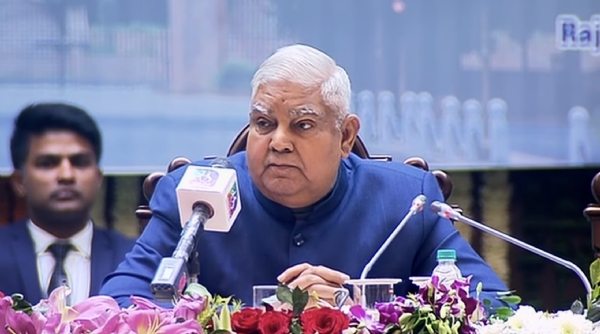'Public posturing from judicial platforms not good': VP Jagdeep Dhankhar's dig at SC
The legislature, he said, did not have the power to write judicial orders, and the executive and judiciary did not have the authority to legislate.
Total Views | 92
Jaipur, January 12: Once again launching a sharp attack on Supreme Court for striking down the law that approved an alternate system to appoint judges, Vice President Jagdeep Dhankhar, "one-upmanship and public posturing" from judicial platforms is not good and these institutions must know how to conduct themselves.

He passed this remark while addressing the 83rd All-India Officer’s conference on Wednesday (January 12). He further continued, "as presiding officers of legislatures, "we cannot have an Ostrich-like stance" on judiciary-legislature relations. Parliamentary sovereignty cannot be permitted to be diluted or compromised by the executive or the judiciary."
Citing the SC’s landmark verdict in the Kesavananda Bharati case which outlines the basic structure of the Constitution, Jagdeep Dhankar said that he cannot subscribe to the idea of a basic structure as laid down by the Supreme Court, where Parliament can amend the Constitution but not its basic structure.
Hon'ble Vice President & Chairman Rajya Sabha, Shri Jagdeep Dhankhar addressing the 83rd All India Presiding Officers’ Conference in Jaipur. Watch Live: https://t.co/3kAs785zuT
— Vice President of India (@VPIndia) January 11, 2023
The legislature, he said, did not have the power to write judicial orders, and the executive and judiciary did not have the authority to legislate.
In an apparent reference to the Supreme Court asking the Attorney General to advise government functionaries to exercise control in their comments on the Collegium, Dhankhar said he did not entertain the A-G on the issue.
“I cannot be a party to emasculating the power of the legislature,” he said, noting that he had been a “soldier of the judiciary”, referring to his career as a lawyer. The Vice-President stressed the importance of those occupying constitutional posts remaining politically neutral.
Also Read | VP Dhankar enters collegium system debate, slams SC in presence of CJI for junking NJAC Act
“People in the executive, legislature and holding senior political positions must take care that high constitutional offices are kept away from their political stance. We have noticed recently some serious observations that are transgressions,” he said without elaborating.
It should be reminded that Dhankhar had, in his maiden speech in the House, slammed the judiciary for scrapping the NJAC Act, describing it as an instance of “severe compromise of parliamentary sovereignty”, and said the government's three organs should respect the “Laxman Rekha”.
Bharati Web







